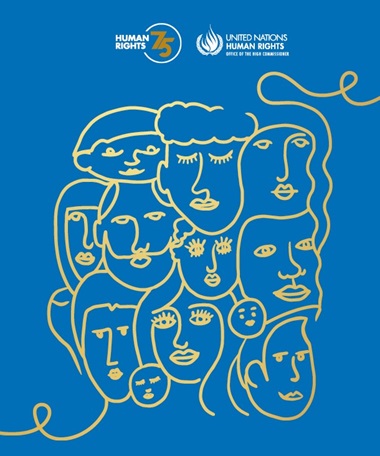 A retired Trinity Western University professor contributed to a book released as part of the recognition and celebration of the 75th anniversary of the Universal Declaration of Human Rights (UDHR) this week.
A retired Trinity Western University professor contributed to a book released as part of the recognition and celebration of the 75th anniversary of the Universal Declaration of Human Rights (UDHR) this week.
Janet Epp Buckingham wrote one of 11 chapters for an edited volume, Shaping a World of Freedoms: 75 Years of Legacy and Impact of the Universal Declaration of Human Rights.
Universal Declaration
The media covered the December 10 event quite widely. For example, Steven Quinn pointed out on The Early Edition:
The document committed nations to recognize all humans as being born free and equal in dignity and rights, regardless of their background, sex, sexual orientation, religion or any other status. The principal author of the first draft was a Canadian legal scholar named John Humphrey.
Quinn interviewed Amyn Sajoo, an SFU professor who studied under Humphrey. He said:
[This man was] completely subverting the traditional understanding of international law, telling us human rights had now put people at the centre of international law. . . .
Every provision of the Universal Declaration begins either with “All human beings” – that’s Article 1 – or “Everyone.” This is unusual in an international agreement, which would normally specify nation states, citizens – your connection to the state. So this was subversive. What it was doing was saying that people have rights which precede the rights that nations have.
Shaping a World of Freedoms
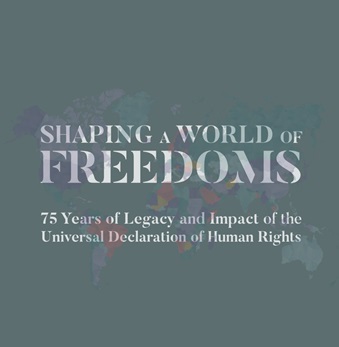 The UNEQUAL World Research Center published Shaping a World of Freedoms and hosted an online conference December 11 – 12. They stated, “Over the past 75 years, the effort to uphold universal human rights and religious freedom has evolved into a delicate balancing act between lofty ideals and harsh realities.”
The UNEQUAL World Research Center published Shaping a World of Freedoms and hosted an online conference December 11 – 12. They stated, “Over the past 75 years, the effort to uphold universal human rights and religious freedom has evolved into a delicate balancing act between lofty ideals and harsh realities.”
The 279-page book covers rights of all types – including the realms of economics, disability, gender and religion. The authors are academics and human rights experts from a wide range of disciplines; a few work, or have worked, directly for various branches of the UN.
Janet Epp Buckingham, who is Co-director of the International Institute for Religious Freedom (Vancouver) and Director, Global Advocacy, for the World Evangelical Alliance – which represents some 600 million Christians worldwide – wrote a chapter titled ‘Exploring the Intersection of Faith and Universal Freedoms: Evangelical Christians and Human Rights.’
She wrote:
Evangelical Christians have had a complex relationship with human rights. On one hand, the Universal Declaration of Human Rights (UN General Assembly 1948) reflects Christian principles. On the other hand, human rights mechanisms
have been used to support policies that are abhorrent to evangelical Christians’ beliefs and identity. The 75th anniversary of the Universal Declaration is a good time to evaluate its impact for Evangelicals.
She acknowledged that some Evangelicals “[see] the United Nations as heading towards world government and potentially the source of the Anti-Christ mentioned in the Bible as part of the end-times.”
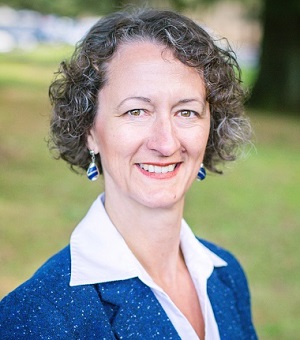
Janet Epp Buckingham contributed a chapter to ‘Shaping a World of Freedoms.’
But she added:
Evangelical Christians around the world aspire to live in states that promote and protect rights and freedoms of their people. They are actively engaged worldwide in providing healthcare, education, community development and humanitarian assistance to the world’s most vulnerable.
The WEA has advocacy offices at the United Nations in New York and Geneva to promote human rights and well-being. The WEA supports the fulfillment of the [Sustainable Development Goals]. . . .
Evangelical Christians look to the Universal Declaration as the minimum standard for protection for religious freedom. This is a very high value to Evangelicals.
They also value other standards for human rights and work along with others towards meeting the Sustainable Development Goals. Evangelicals provide humanitarian assistance, community development, education,
and peace and reconciliation, all aspiring towards “a social and international order” as articulated in Article 28.
A PDF of Shaping a World of Freedoms can be read here. Buckingham’s article begins on page 161.
Drafters of the Declaration
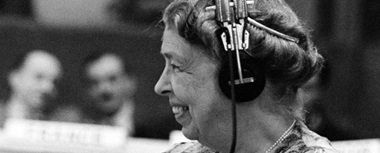
Eleanor Roosevelt chaired the Commission on Human Rights (UDHR Drafting Committee page).
Christians were key players in creating the UDHR. Two of the three people described on the UN’s Drafters of the Declaration page were strongly committed Christians:
In February 1947, a group consisting of Eleanor Roosevelt, Peng Chun Chang and Charles Malik began drafting the International Bill of Human Rights. With assistance of the UN Secretariat, the task of formulating a preliminary draft was given to John Humphrey, Director of the UN Secretariat’s Division for Human Rights.
Following a letter from the Chairman of the Commission on Human Rights to the President of the Economic and Social Council, dated 27 March 1947, (E/383), this Drafting Committee was enlarged. It was then composed of the members of the Commission on Human Rights for Australia, China, Chile, France, Lebanon, the United States, the United Kingdom and the Union of Soviet Socialist Republics.
Harvard law professor Mary Ann Glendon concluded an insightful First Things article by saying:
No portrait of Eleanor Roosevelt will be complete that does not include her career as a gifted diplomat, her understanding of the importance of the institutions of civil society, and the religious convictions that gave life to her impassioned commitment to social activism.
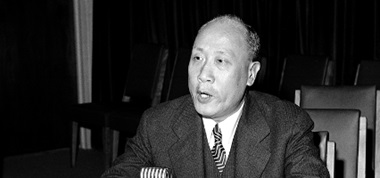
Peng Chun Chang was Vice Chair of the Commission on Human Rights (UDHR Drafting Committee page).
Referring to “the high-minded Protestant Christianity that was so much a part of her public and private persona,” Glendon spoke highly of her ability to graciously lead the fractious UDHR team:
By Roosevelt’s account, Dr. Chang was “a pluralist and held forth in charming fashion on the proposition that there is more than one kind of ultimate reality.” Malik responded to the remark by an extended reference to the philosophy of Thomas Aquinas. . . .
Roosevelt regularly hosted small social gatherings for colleagues, believing that personal connections could help to reduce professional tensions. She had brought Chang and Malik together in the hope, as she put it, “that our work might be advanced by an informal atmosphere.”
What she did not mention in her autobiography, but what the UN record shows, is that bickering between Chang and Malik, who had emerged as intellectual leaders on the commission, was threatening to become a problem. In such cases it was not her style to take people to the woodshed; instead, she invited them to tea.
Although the arguments between the two never completely ceased, Roosevelt did succeed in getting them to work together effectively on the all-important drafting committee.
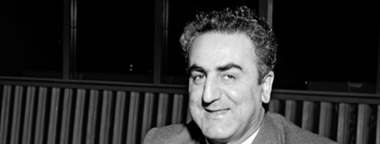
Charles Habib Malik was Rapporteur of the Commission on Human Rights (UDHR Drafting Committee page).
Go here for the full article.
The UDHR Drafting Committee page stated:
Philosopher and diplomat, Mr. Charles Habib Malik pursued an academic career in philosophy at Harvard University and founded the philosophy department at the American University of Beirut. He was also a theologian who successfully reached across religious lines, appealing to his fellow Eastern Orthodox Christians, Roman Catholics and Evangelicals alike.
Malik remembered
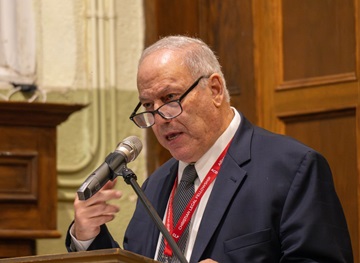
Habib Malik spoke about his father Charles Malik, and his key role in creating the UDHF, at a CLF symposium this fall. (CLF image)
A major Symposium organized by the Christian Legal Fellowship (CLF) was devoted to ‘Commemorating the 75th Anniversary of the Universal Declaration of Human Rights.’ Scholars, jurists and legal professionals from across Canada and around the world gathered at Wycliffe College (University of Toronto) September 28.
A December 8 post by Mike Jehu on the CLF site included this portion:
Professor Habib Malik (Lebanese American University, retired) concluded the Symposium with a special lecture on a central figure in the construction of the UDHR: his late father, Dr. Charles Malik.
A Lebanese diplomate, politician and philosopher, Dr. Charles Malik played a pivotal role in developing the UDHR and securing its adoption at the UN General Assembly, without a single dissenting vote.
Dr. Malik’s commitment to protecting human rights was informed by his Christian faith, as was his work in building cross-cultural consensus on universal principles underpinning human nature. That is, humans are endowed with rationality, conscience and reason, and possess inherent dignity and worth.
Charles Malik’s words in the UDHR preamble echo throughout history: “Recognition of the inherent dignity and of the equal and inalienable rights of all members of the human family is the foundation of freedom, justice and peace in the world.”
Jehu said of the Symposium:
Participants presented working papers on various aspects of the UDHR, including its history, the scope of its global impacts and certain sections that have received scant attention in Canadian law. Selected papers will be included in a special collection of essays, to be published by LexisNexis Canada next year.
Go here for the full account, which details many of the presentations.
Links
Here are some useful links from the United Nations, regarding the Universal Declaration of Human Rights:
